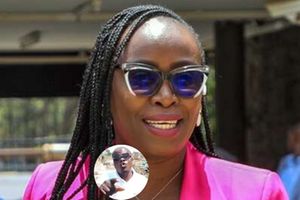Why that first degree should not limit your career moves

Graduands during the Technical University of Mombasa 2nd graduation ceremony on December 4, 2014. PHOTO | KEVIN ODIT | NATION MEDIA GROUP
What you need to know:
“I remember when I finished high school I wanted to do electrical engineering, but I missed the cut-off by one point and ended up in the teaching field.
“I was disturbed until I met someone who told me the first degree could become the base to broaden my mind and focus on a particular career, whether completely different or linked to the certificate.”
According to him, what many people do not tell university students is that earning a degree in a field that does not interest them does not necessarily mean they are stuck with that bad choice for the rest of their working lives.
In the 1960s one could get a job armed with nothing but a high school certificate. Back then, any good education, expecially if it came with a good mastery of the Queen’s language, could earn you a plum posting.
Fast-forward to today, when even a doctorate qualification does not guarantee you a good job, or any job at all. With the industry getting more competitive as more graduates join the job market every year, the question you are bound to ask yourself is: Does my first degree really determine my career?
The answer is a big ‘No’.
“Having a first degree, the grade notwithstanding, is no longer a certainty that a graduate will get into the career he or she has always dreamt of,” says Ms Dorcas Karuana, a career advisor at Corporate Staffing Services, Nairobi.
No longer pulls major strings
Even though the first degree is still important towards advancing one’s career, she states, it no longer pulls the major strings, and a college graduate today needs to consider other factors if he or she is to get his or her desired job.
“I think the job market has really diversified, and that’s a good thing. With many people graduating and entering a market that is not growing proportionally, the laws of demand and supply are coming into play and really frustrating a lot of graduates.”
So, what is the value of a first degree then?
FIRST STEP
Ms Karuana equates it with a beautician’s foundation, which only prepares the ground for more important work.
“Though the foundation plays a role when it comes to the final image desired, it only provides a basis for other things necessary to achieve the image,” she says.
That means that what a first degree does for you is give you a foundation to launch your career, after which you need to enrich your marketability with experiences and other competencies.
This, says Dr Hesbon Nyagowa, the academic registrar at Technical University of Kenya, makes your first degree nothing more than a stepping stone into the job market.
“It’s the basis for other things you need to do before you get into the career you want,” he observes.
“I remember when I finished high school I wanted to do electrical engineering, but I missed the cut-off by one point and ended up in the teaching field.
“I was disturbed until I met someone who told me the first degree could become the base to broaden my mind and focus on a particular career, whether completely different or linked to the certificate.”
According to him, what many people do not tell university students is that earning a degree in a field that does not interest them does not necessarily mean they are stuck with that bad choice for the rest of their working lives.
“What I advise my students is to learn as much as possible and then sit back and reflect on the career implications.”
In this case, that includes realising that the first degree does not really determine your career.
BEING INTUITIVE
“If you study journalism and you walk into a newsroom, you may discover that editors don’t really care whether you got a First Class qualification or not. What they are instead interested in is the quality of stories you file,” he says, explaining that the environment you grew in, the people you interacted with, and the capabilities and skills you have might end up charting your career path more than your certificates.
Suitable personality
“Your personality, the job market and new social developments are also key determinants in regard to your career,” Ms Karuana adds.
“If you are a reserved person and the Kenya Universities and Colleges Central Placement Service places you in a sales degree field because you didn’t apply for a course that is suitable to your personality, you will find yourself unable to spend your whole life in a sales career, even though you studied that as your first degree.”
As such, Dr Nyagowa chips in, being intuitive helps you to gravitate towards your desired career.
“Thinking ahead is what really determines what career one will work in as it guides one into packaging oneself to be someone who can succeed in the career one wants,” he observes.
After Dr Nyagowa got into teaching, he only spent time in class for five years before a bulb lit in his head and he realised he could still pursue his dream, or something close to his dream.
“I felt I needed to be closer to professors, and in that spirit went to work at the University of Nairobi as an assistant registrar in the Institute for Development Studies,” he says.
At the UoN, his core duties involved IT and finance, and this motivated him to do an MBA — with a finance major — and thereafter a PhD in management information systems.
“If my first degree were to determine my career, I would still be a headteacher at Maranda High School!” he points out.
Similarly, Mr Albert Njogu, a senior engineer at Seven Seas Technologies, feels that had he followed his electrical and electronics engineering ambition to its conclusion, he would be working in a power plant now.
Deciding one’s career, it follows, is a very important decision, and thinking logically while considering other factors at play is extremely vital.
_________________
PASSION VS SKILLS: CAREER IS NOT JUST ABOUT WHAT GIVES YOU THE KICKS:
Cindy Lavinian, a second year human resource management student at the University of Nairobi, has always had a passion for music, so what is she doing in an HR class?
“I intend to use the skills I acquire from my first degree to further my music career,” she explains.
“I love music but I can’t disappoint my parents. They have advised and influenced me towards doing this course, but in future I have to get into music.”
According to career counsellors, however, passion is an emotional preference, and unless one has a way of turning it to reality — and thus a skill — it may not be a good basis for determining your career.





